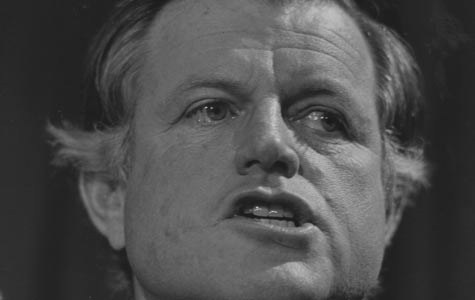
Photo: Richard M. Feldman, 1980 |
This article was originally published in the Capital Letters of the December 11, 1979 Boston Phoenix
Washington – Edward M. Kennedy's presidential campaign has a serious problem, and the problem appears to be Edward M. Kennedy. During the week in which leadership was transformed from a word in the lexicon of his campaign rhetoric to a measurable reality, Kennedy succeeded in verbally vanishing himself to a political isolation that had been, until his improvident remarks, solely the province of the Iranian government.
At the same time that every member of the UN Security Council – including representative of Czechoslovakia and the Soviet Union – could be seen on our TV screens raising his hand in support of a resolution condemning Iran's actions – a resolution condemning Iran's actions – a resolution that assiduously avoided any mention of the shah – Kennedy could also be viewed carelessly debasing the shah with a hyperbolic gusto equaled only by Jimmy Carter's foppish praise of Pahlevi a few months before he was overthrown. These images were swiftly followed by those of Iranian newspapers happily headlining Kennedy's condemnation of Pahlevi and head shots of the churlish Ghotbzadeh, gloating over Kennedy's goof. They were not images destined to make Kennedy the darling of patriotic citizens in America's hinterlands.
"If the Iranians aren't printing up posters with Khomeini and Kennedy standing side by side in the crowd outside the embassy," a Carter adviser chuckled facetiously, "hopefully somebody in the CIA will have the good sense to think of it."
Kennedy supporters, understandably, are finding much less to laugh about in his performance. "I think the Iranian thing is potentially fatal," says one of his ardent backers in Massachusetts, "one of the worst kind of political statements I've ever seen." The criticism emanating from Kennedyites on Capitol Hill is equally damning, though "disappointment" is the word they use most frequently. "If you're a Kennedy guy," explained one of Teddy's more loyal congressional allies, "you figure anything he says, you can excuse it. But you don't want to have to excuse something every day." An angered member of House leadership was more direct: "It literally dilutes our negotiating position by reinforcing Iran's negotiation position."
Kennedy's campaign staff concedes that the senator was not operating on advice from his tacticians; he was flying on automatic pilot. Predictably, staffers attempt to rationalize away the impact of his faux pas, insisting that "he's right on the merits; it's a close call on timing." The more enlightened view appeared to come from the beleaguered switchboard operator at Kennedy headquarters. Apparently moved more by hard realities than by far-fetched rationalizations, she confessed that incoming calls from the public are running overwhelmingly against Kennedy's remarks. That voters glean a grain of truth amid Kennedy's blast against the shah is both probable and inconsequential, since, as any number of national polls have revealed, the public seems to have an amazingly sophisticated understanding of the negotiating symbols involved in these circumstances.
Thus, as was the case with Watergate, the public appears to be ahead of politicians' perceptions – or at least of Ted Kennedy's perceptions in this situation. People understand that the question is not the shah himself, as Kennedy would have it, but the necessity of defending principles of international diplomacy.